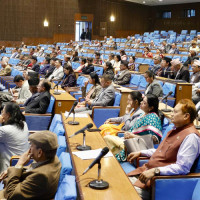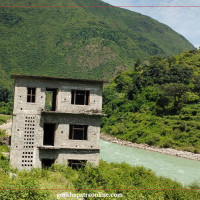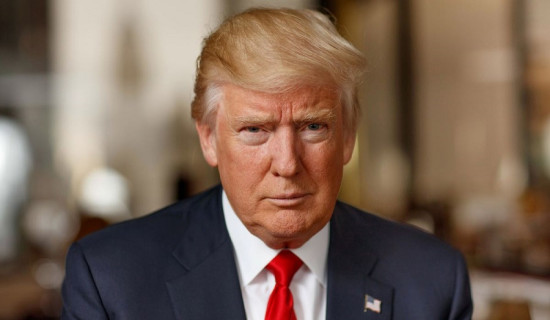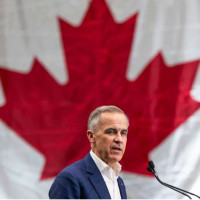- Tuesday, 29 April 2025
Deuba urges private sector to increase investment
By A Staff Reporter,Kathmandu, Apr. 29: Nepali Congress President Sher Bahadur Deuba has said that the budget for the upcoming fiscal year 2025/26 will revitalise the economic sector by addressing the issues raised by the private sector.
He made this remark at an interaction organised by Nepali Congress-Industry and Chamber Department at a time when the government is preparing budget for the upcoming fiscal year 2025/26 on Monday. "The need of the country now is to make the nation economically viable and move it towards prosperity. For this, the role of the government as well as the private sector is equally important. So, I want to urge the private sector to invest confidently," he said.
He said that it is necessary to move forward with a focus on encouraging our local products, promoting indigenous skills, and increasing entrepreneurship in the country. "It is necessary for the private sector to be active in the promotion of our original products, herbal and organic agricultural production. For this, I am confident that the present government will move forward taking the private sector in to confidence," President Deuba said.
He said that the digital economy has started to occupy a large share in recent times, and both the government and the private sector need to move forward with special attention in this regard.
President Deuba said that policies and programmes and budget will be prepared to encourage the digital economy. He urged the private sector to pay special attention to this and identify areas of investment according to the innovation of information technology.
Stating that the Nepali Congress is always at the forefront of listening to the problems of the private sector and solving them, he said that our economy will become stronger only if there is balanced cooperation between the private sector and the government.
On the occasion, private sector's umbrella organisations submitted the suggestions for the budget. President of Federation of Nepalese Chambers of Commerce and Industry (NCCI) Chandra Prasad Dhakal suggested that the Nepali Congress, the largest political party in the Parliament, should include aspects such as expansion of an open economy with social justice, structural changes for a new phase of economic reform, promotion of the private sector and investment, promotion of good governance and revenue mobilisation, and effectiveness of public expenditure in its objectives and priorities.
He said that the biggest problem in Nepal's budget process for about two decades has been the inability to make capital expenditure. Due to the trend of only about 17 per cent of the budget being allocated for capital expenditure and that too only about 60 per cent being spent, the expected development in the country has not been achieved, he said.
The Federation has suggested that the budget size for the next two years should not increase by more than 15 per cent without affecting capital expenditure. In a situation where the economy is basically supported by remittances and various study reports are predicting that there will be no demographic gain after 2045, an economy dependent on remittances will be at risk, Dhakal said, adding that it is necessary to formulate the upcoming budget in a way that will advance the second phase of economic reforms.
According to a study conducted by the FNCCI and the World Bank, the private sector contributes to 81 per cent of the economy and provides 86 per cent of employment, and all parties should publicly acknowledge the importance of the private sector and ensure an environment where entrepreneurs and businessmen can do business with respect, he said.
Similarly, Nepal Chamber of Commerce (NCC) suggested to the Nepali Congress to prioritise an investment-friendly environment and production-oriented policies in the upcoming budget.
Acting President of NCC Deepak Malhotra presented suggestions to NCC President Deuba.
It suggested that the burden of past problems is the main reason behind the decline in the morale of entrepreneurs and businessmen, so policy-level facilitation should be provided for an investment-friendly environment.
"Since the financial risk-bearing capacity of the private sector is very low, it is not possible to take loans from banks and financial institutions to start new ventures and businesses by taking additional risks," said Malhotra.
The chamber has suggested that the Working Capital Loan Directive should be repealed to make the economy dynamic.
He said that due to the complex provisions in the Working Capital Loan Directive, credit has not been expanded despite the high amount of investable funds in banks and financial institutions.
















